

 |
|||||
|
|||||
 And how stands the city on this winter night? More prosperous, more secure,
and happier than it was 8 years ago. But more than that: After 200 years, two centuries, she still stands strong and true
on the granite ridge, and her glow has held steady no matter what storm. And she's still a beacon, still a magnet for all
who must have freedom, for all the pilgrims from all the lost places who are hurtling through the darkness, toward home. We've done our part. And as I walk off into the city streets, a final word to the men and women of the Reagan revolution,
the men and women across America who for 8 years did the work that brought America back. My friends: We did it. We weren't
just marking time. We made a difference. We made the city stronger, we made the city freer, and we left her in good hands.
All in all, not bad, not bad at all. And so, goodbye, God bless you, and God bless the United States of America.
--Ronald Reagans Farewell Speech
|
||||||||||
|
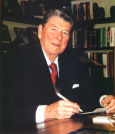
Reagan served from 1981 to 1989 as the 40th president of the United States.
At the age of 69, he was the oldest man ever sworn into that office. Reagan's previous executive experience included two terms
as president of the Screen Actors Guild (1952, 1959-60) and governor of the nation's most populous state, California (1966-74).
Many books have been written about Ronald Reagan which describe his life
in great detail. Reagan also wrote two biographies.
Indepth Timeline, Click Here... 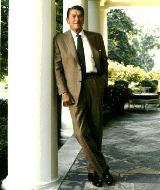 This page is dedicated to the winning of Cold War and the resulting freedom for hundreds
of millions of people; to the revival of the American Spirit from a point of near-surrender to one of unparalleled greatness;
and to the Reagan Era expansion—one that would grow to become the greatest peace-time expansion in U.S. history. The
Reagan Era was a time in which every income quintile saw gains in overall wealth and income, a time in which the middle class
gained the most and our economy grew by a third. Ronald Reagan championed four "Pillars of Freedom": individual liberty, economic
opportunity, global democracy and national pride
 |
 Welfare's purpose should be to eliminate, as far as possible, the need for its own
existence.
Los Angeles Times, January 7, 1970
It is not my intention to do away with government. It is rather to make it
work -- work with us, not over us; stand by our side, not ride on our back. Government can and must provide opportunity, not
smother it; foster productivity, not stifle it.
First Inaugural Address, January 20, 1981
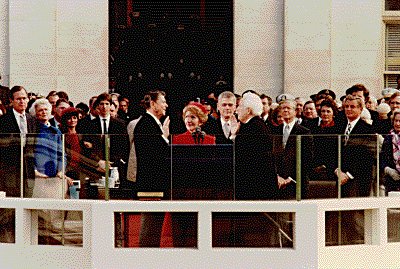 It is the Soviet Union that runs against the tide of history.... [It is]
the march of freedom and democracy which will leave Marxism- Leninism on the ash heap of history as it has left other tyrannies
which stifle the freedom and muzzle the self-expression of the people.
Speech to Britain's Parliament, June, 1982
Let us beware that while they [Soviet rulers] preach the supremacy of the state,
declare its omnipotence over individual man, and predict its eventual domination over all the peoples of the earth, they are
the focus of evil in the modern world.... I urge you to beware the temptation ... to ignore the facts of history and the aggressive
impulses of an evil empire, to simply call the arms race a giant misunderstanding and thereby remove yourself from the struggle
between right and wrong, good and evil.
Speech to the National Association of Evangelicals, March 8, 1983
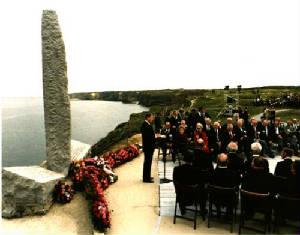 We will always remember. We will always be proud. We will always be prepared,
so we may always be free.
Normandy, France, June 6, 1984
The men of Normandy had faith that what they were doing was right, faith that they
fought for all humanity, faith that a just God would grant them mercy on this beachhead or the next. It was the deep knowledge
-- and pray God we have not lost it -- that there is a profound moral difference between the use of force for liberation and
the use of force for conquest.
Normandy, France, June 6, 1984.
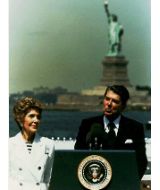 We will never forget them, nor the last time we saw them -- this morning,
as they prepared for their journey, and waved good-bye, and "slipped the surly bonds of earth" to "touch the face of God."
Speech about the Challenger disaster, January 28, 1986
How do you tell a Communist? Well, it's someone who reads Marx and Lenin. And how
do you tell an anti-Communist? It's someone who understands Marx and Lenin.
Remarks in Arlington, Virginia, September 25, 1987
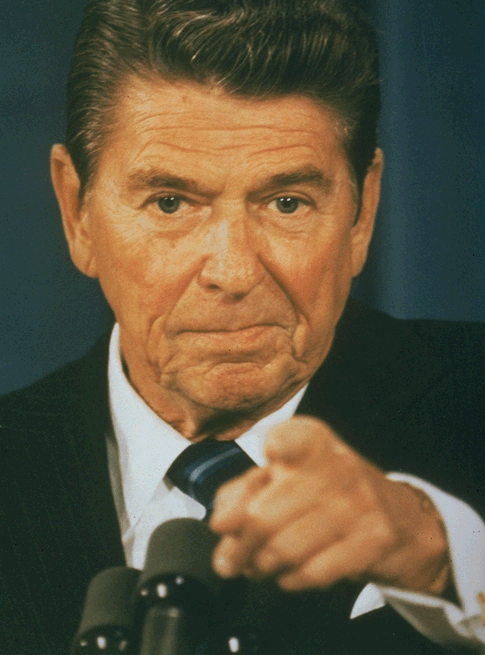 Mr. Gorbachev, open this gate! Mr. Gorbachev, tear down this wall!
Speech near the Berlin Wall, 1987
Freedom is the right to question and change the established way of doing things.
It is the continuous revolution of the marketplace. It is the understanding that allows to recognize shortcomings and seek
solutions.
Address to students at Moscow State University, May 31, 1988
Have we the courage and the will to face up to the immorality and discrimination
of the progressive tax, and demand a return to traditional proportionate taxation? . . . Today in our country the tax collector's
share is 37 cents of every dollar earned. Freedom has never been so fragile, so close to slipping from our grasp.
October 27, 1964
If all of this seems like a great deal of trouble, think what's at stake. We are
faced with the most evil enemy mankind has known in his long climb from the swamp to the stars. There can be no security anywhere
in the free world if there is no fiscal and economic stability within the United States. Those who ask us to trade our freedom
for the soup kitchen of the welfare state are architects of a policy of accommodation.
Address to the nation, October 27, 1964
It's time we asked ourselves if we still know the freedoms intended for us
by the Founding Fathers. James Madison said, "We base all our experiments on the capacity of mankind for self-government."
This idea that government was beholden to the people, that it had no other source of power, is still the newest, most unique
idea in all the long history of man's relation to man. This is the issue of this election: Whether we believe in our capacity
for self-government or whether we abandon the American Revolution and confess that a little intellectual elite in a far-distant
capital can plan our lives for us better than we can plan them ourselves.
Address to the nation, October 27, 1964
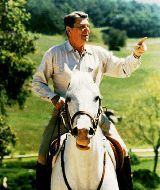 The poet called Miss Liberty's torch, "the lamp beside the golden door." Well, that
was the entrance to America, and it still is. And now you really know why we're here tonight.
The glistening hope of that lamp is still ours. Every promise every opportunity is
still golden in this land. And through that golden door our children can walk into tomorrow with the knowledge that no one
can be denied the promise that is America.
Her heart is full; her torch is still golden, her future bright. She has arms big
enough to comfort and strong enough to support, for the strength in her arms is the strength of her people. She will carry
on in the eighties unafraid, unashamed, and unsurpassed.
In this springtime of hope, some lights seem eternal; America's is.
RNC speech, August 23, 1984
 |
|||||||||
|
 |
||||||||||